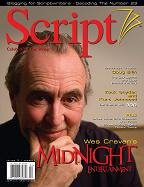TUC: Let’s start with a little about your writing experience and background.
Woods: As I am unpublished and unproduced, I do not consider myself a professional writer. Although I learned a lot from an exceptional novelist/instructor in my younger days, it was more in the group, rather than classroom, setting. My literary endeavors have been primarily an on again, off again hobby, sometimes rewarding, more often exasperating, which places me in the same category as 98% of the world’s writers!
TUC: You mentioned a little in your emails about how the leads in THE WITCH AND THE GARDEN were inspired by real people!
 Woods: In the mid 90’s, I became close friends with two teenage girls, (we’ll call them) “L & M,” imprisoned for their roles in a macabre group slaying on a desolate night somewhere in the heart of darkest America. Although this case spawned a mini-cottage industry unto itself, I was never interested in writing about or exploiting the tragedy. What did interest me was the poetry they shared with me; their memories, dreams, troubled past. I wanted to see the world through their eyes to understand how they veered so far off course, but obviously, this was not entirely possible as our lives were separated by time, distance and steel bars. Through a kind of unintended osmosis, they evolved into the leads in my own private theater.
Woods: In the mid 90’s, I became close friends with two teenage girls, (we’ll call them) “L & M,” imprisoned for their roles in a macabre group slaying on a desolate night somewhere in the heart of darkest America. Although this case spawned a mini-cottage industry unto itself, I was never interested in writing about or exploiting the tragedy. What did interest me was the poetry they shared with me; their memories, dreams, troubled past. I wanted to see the world through their eyes to understand how they veered so far off course, but obviously, this was not entirely possible as our lives were separated by time, distance and steel bars. Through a kind of unintended osmosis, they evolved into the leads in my own private theater.L & M would be transformed into Luna and Terra, appropriate names considering the revolving, symbiotic nature of their relationship. Psychologically speaking, I stripped them to their barest selves with absolutely no focus whatsoever upon their horrific crime. From a purely cinematic standpoint, I wanted to avoid contemporary referencing, although, admittedly, the success of Blair Witch Project was the original impetus. I returned to my earliest childhood cultural experiences, sitting before our B&W TV, mesmerized by Margaret Hamilton and The Wizard of Oz. “I want to do that when I grow up,” but it never happened. Memories of my mother, who was entering her last days as I was writing this script, reading Hansel and Gretel and other grim tales. The Witch and the Garden was composed in a 3-4 month period in late 2001. Since the structure was to be a conflation of the two classics noted, and the garden imagery would recall The Book of Genesis, I spent little time with pre-write, outlines, etc. There was no revision, as I prefer to edit as I write, but I did add two brief scenes the following year, including the picture book prologue.
TUC: You also mentioned how you felt this would be viewed as an “art house project,” which goes against the grain of nearly every undiscovered screenwriter anxious to cry out, “It’ll be commercial!”
Woods: I believe there is a potential cult audience, both European & American, for this project, although I obviously realize it’s not studio material. I also realize it would be no small feat to tailor specific talent to a vision this idiosyncratic and personal. Hopefully, there are some up-and-coming Tim Burtons or Terry Gilliams checking out this web site, searching for unusual material. If nothing else, it would turn heads. Ultimately, it’s all about good luck and exposure and I appreciate that you’ve given me a bit of both. The fact that a surrealist horror/fantasy and an animation script were among your top (2006 selections) indicates you have pretty eclectic taste!
TUC: Any other writing, past or present, you’ve been a part of?
Woods: My first script, Leave It To Kitten: The Forgotten Episodes is a savage, ironic parody of the American sitcom, the final detonation of the nuclear family. Crux of story: the sitcom princess, Kitten befriends a troubled loner and soon finds herself in prison for a murder beyond her wildest dreams. End of story; end of life. As for new projects, I’ve been searching for a collaborator to rework a psychological suspense thriller, Waiting for Mr. Wright. Like Hitchcock’s Vertigo, it is constructed around a dramatic opening sequence and a terrifying, innovative conclusion. Unlike Vertigo, the middle is all over the place. Hopefully, a disciplined, coherent storyteller can help me navigate the memories, dreams and mayhem in this baffling script. I don’t know about other writers, but I find it difficult to go on to new projects until I have completed and perfected the old. Perhaps that is one reason I have a pitifully small number of works to my name, even though I’ve just turned 50!





No comments:
Post a Comment